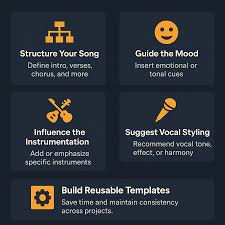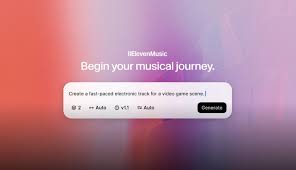AI music tools are exploding right now, but not all platforms are created equal. If you're a content creator, indie developer, or just someone who wants fast royalty-free music, you’ve probably heard about LoudMe and Suno.
Both claim to generate original music in seconds using AI. But when it comes down to actual usability, sound quality, licensing, and creative control, LoudMe vs Suno is not an equal match.
So—which one is better, and why?
In this detailed breakdown, we’ll compare LoudMe and Suno across key categories like ease of use, music quality, vocal realism, licensing, and real-world applications. Whether you're making YouTube videos or building a brand soundtrack, this comparison will help you make the smarter choice.

What Is LoudMe?
LoudMe is a free, browser-based AI music and sound effect generator. You type in a text prompt, such as “ambient lo-fi with wind chimes” or “cinematic tension build-up,” and LoudMe creates a short track based on your request—usually around 1–2 minutes long.
Key features of LoudMe:
Zero sign-up required to test
Generates MP3 downloads in seconds
Includes AI vocals (basic)
Offers sound effects, not just music
Pro plans unlock commercial use
It’s lightweight, fast, and fun—but limited in depth and sound fidelity.
What Is Suno?
Suno is a next-generation AI music generator best known for its song-creation capabilities. The standout feature? It doesn't just generate background music—it can create full songs with realistic vocals, lyrics, and structure in under a minute.
Core features of Suno:
Generates full songs (intro, verse, chorus)
Advanced AI vocals with multiple styles
Lyric input support (you can write your own)
Realistic instrumentation and mixing
Direct integration with Spotify and social platforms
Suno is designed for people who want full, polished compositions—whether you’re making a song from scratch or creating commercial soundtracks.
LoudMe vs Suno: Side-by-Side Feature Comparison
| Feature | LoudMe | Suno |
|---|---|---|
| Free Access | ? Yes (no login required) | ? Yes (via sign-up) |
| Vocal Quality | ?? Basic and robotic | ?? Realistic, expressive |
| Lyrics Support | ? No | ? Yes (AI-written or user-written) |
| Music Quality | ?? Low to mid (MP3 only) | ?? High fidelity, mixed tracks |
| SFX Generation | ? Yes | ? No |
| Genres Supported | ?? Limited, mostly lo-fi/trap | ?? Wide genre range (pop, rock, etc.) |
| Output Length | 1–2 min tracks | Full-length songs |
| Commercial Use | ? With Pro subscription | ?? Not allowed (as of July 2025) |
| API Access | ? None | ? (waitlist only) |
Music Quality and Realism: Suno Clearly Wins
When it comes to sound quality and realism, Suno is far ahead.
LoudMe tracks often feel generic. Most compositions lean toward synthetic, beat-driven loops with minimal variation. Vocals, when present, sound like early-stage TTS (text-to-speech) samples with little nuance.
Suno, on the other hand, generates full compositions that feel like studio-grade demos. It can mimic the structure of a pop song, complete with intros, bridges, and natural transitions between verse and chorus. The vocals are expressive enough to fit everything from sad ballads to high-energy EDM.
If you're aiming for share-worthy music, Suno is a better fit by a long shot.
Creative Flexibility: Suno Offers More Control
LoudMe is easy but basic. You can’t fine-tune BPM, key, structure, or even genre that precisely. The “Extend” and “Remix” buttons generate different outputs, but they feel random.
Suno, by contrast, lets you:
Input custom lyrics
Choose genres and moods
Name your song
Preview different vocal styles
This makes it ideal for semi-professionals or creators who need more than a randomized loop.
Licensing: LoudMe Is Safer for Commercial Use (for Now)
If you're producing content for YouTube, TikTok, games, or podcasts, licensing matters.
LoudMe lets you use generated music royalty-free on a paid Pro plan. Tracks can be used in monetized content without takedowns.
Suno currently does not allow commercial use. You can’t sell, license, or use Suno music in products without written approval.
So while Suno’s output is higher quality, LoudMe is safer for commercial publishing at this point in time.
That said, Suno’s team has hinted at future licensing tiers and commercial options.
Use Cases: Which Tool Fits Your Project?
If you’re a:
Social media creator: LoudMe is great for short-form audio, ambient music, or TikTok SFX.
Musician experimenting with new ideas: Suno lets you explore full songs quickly without hiring a producer.
Game dev needing SFX + looped music: LoudMe’s sound effects tool comes in handy.
Podcaster or video editor: Suno offers polished intros/outros; LoudMe helps with filler loops.
In short: LoudMe is a fast generator, Suno is a song builder.
Real User Feedback
“LoudMe gives me quick beats when I need background tracks, but Suno feels like magic—it’s like collaborating with an invisible band.”
– Indie content creator
“I like LoudMe for sound effects, but I wouldn’t use it for anything serious.”
– TikTok editor
“Suno’s vocals are unreal. Still waiting for commercial use, though.”
– AI music YouTuber
Final Verdict: LoudMe or Suno?
It comes down to your goal:
If you want quick, usable, royalty-free audio, go with LoudMe.
If you want high-quality AI-generated songs, Suno is the clear winner—even if it’s currently limited for commercial use.
For serious music creation, Suno leads the race. But for practical content support, LoudMe holds its own.
FAQs
Is LoudMe free to use?
Yes, with optional Pro plans for commercial usage and faster rendering.
Can I sell Suno music?
Not yet. Suno doesn’t allow commercial use under its current terms.
Which platform is better for vocals?
Suno, by far. LoudMe vocals are synthetic; Suno’s are emotionally dynamic.
Does LoudMe support SFX?
Yes. It has a built-in sound effect generator for short noises and effects.
Can I use LoudMe and Suno together?
Absolutely. Many creators use Suno for vocal leads and LoudMe for atmospheric pads or SFX.
Learn more about AI MUSIC








